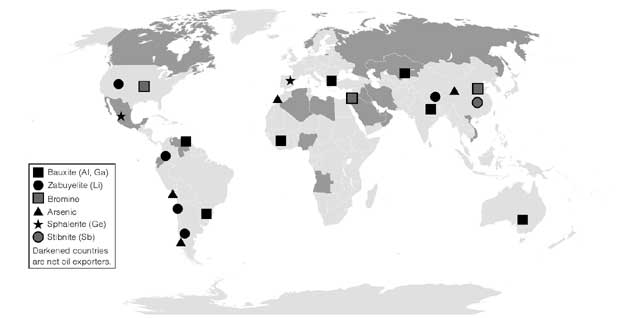What Are The Internet's Dependencies?
By Barath Raghavan
05 August, 2011
Contraposition
In my last post, I looked at the Internet's energy use, broadly construed, and contended that we might offload other societal functions onto the Internet. In this post I'd like to consider in what ways that might be an unwise approach given the dependencies of the Internet.
A couple of months ago, Greer argued that complexity limits might make otherwise sustainable-looking systems falter. That is, suppose a system uses very little energy, but requires a set of social arrangements, manufacturing and mining systems, and engineering knowledge to make it work at all. Those complex dependencies might be the system's undoing even if it doesn't run out of energy.
The Internet is composed of a complex array of hardware and software assembled around the world with materials, energy, skills, and designs also from a global resource base. With this complexity comes vulnerability to threats: disruptions in global supply chains, energy shortages, societal instability, and government intervention into its operation. The last two decades have been relatively placid compared with the previous eight or previous eighty, and have provided an environment in which the Internet has been able to grow at a phenomenal pace.
In the spirit of appropriate technology, a colleague of mine, Shaddi, and I decided to analyze the dependencies of the Internet, down to their roots. Our goal was to understand where we might intervene in the system to make pieces of it more locally-reproducible, and thus more resilient. The result was a bit overwhelming, but perhaps a wake-up call.
We looked at a use case of two people communicating over the Internet over a long distance - the dependencies of that scenario are shown in the diagram below (click to zoom). Each box denotes an abstract or concrete component, resource, or function of the Internet or one of its dependencies. Arrows denote dependency; dashed arrows denote optional dependency (a "one of these" relationship). At the top is the use case. We quickly move through the higher layers which represent mostly functional and abstract pieces that we recognize as pieces of the Internet and on to the lower layers which reside in the realm of hardware. Once we move beyond hardware manufacturing we enter the realm of chemical compounds and natural resources that are required for many of the relevant manufacturing processes, from making fiber optics to printing circuit boards. We end with ores or otherwise naturally occurring resources. We decided not to depict operational or deployment dependencies since they tend to involve a small number of processes like power generation and transportation.
Where the dependencies come from is just as important as what they are - the map below shows the origins of some of the many resources from the dependency diagram above. The idea of global commodities and international trade are so firmly entrenched in our thinking today that we take for granted that a resource in another country can be tapped if the price or force is right. However, this is a modern notion, one whose history is scarcely four decades old; higher energy costs and increased resource competition might complicate the picture in the decades to come.
We considered a number of ways of eliminating these dependencies, though I'll have to go into that another time. Suffice it to say that we didn't find particularly elegant ways of replacing the complex and global dependencies the Internet has today.
About ‘Contraposition’: There’s an aphorism in philosophical circles that goes “One man’s modus ponens is another man’s modus tollens.” The idea is that two people can agree on a conditional statement `If p then q‘, but use it to make different inferences. Someone who endorses p will conclude that q (that’s modus ponens). Someone who denies q will deny p (that’s modus tollens). This double aspect of the conditional shows up in the fact that, in classical logic, ‘p -> q‘ is equivalent to ‘~q -> ~p‘. Converting from one to the other is called contraposition.
We’ve noticed that much of the sustainability/green/environmental community likes to reason in only one direction:
(1) If we’re going to maintain the current economy (p), then we’ll need alternative fuels that meet current energy needs (q).
But why not contrapose?
(2) If we can’t get alternative fuels to meet current energy needs (~q), then we won’t be able to maintain the current economy (~p).
If you emphasize (1), the lesson is: let’s get to work on making alternative fuels meet current (extravagant) energy needs. But if you emphasize (2), the lesson is: let’s start thinking about what a different economy would look like. We think it’s vital to start thinking about both directions, and not neglect the contrapositive.
Comments are not moderated. Please be responsible and civil in your postings and stay within the topic discussed in the article too. If you find inappropriate comments, just Flag (Report) them and they will move into moderation que.




